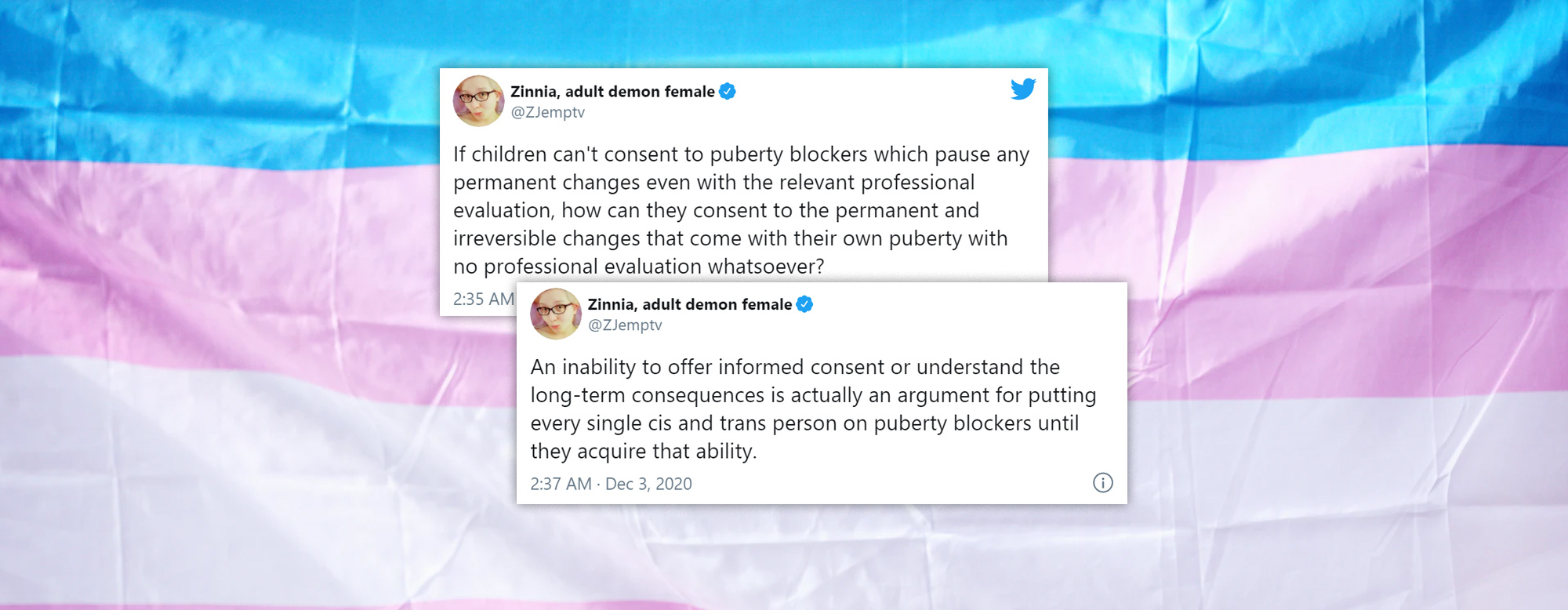A transgender activist has said all children should be placed on puberty blockers until they are old enough to consent to the changes that naturally take place to their bodies during puberty.
Lauren “Zinnia Jones” McNamara, a biological male who identifies as female, argued that since trans children cannot consent to puberty blockers which cause irreversible change, they cannot consent to their own body’s natural puberty process either.
In a series of posts on Twitter, McNamara said: “If children can’t consent to puberty blockers which pause any permanent changes even with the relevant professional evaluation, how can they consent to the permanent and irreversible changes that come with their own puberty with no professional evaluation whatsoever?
If children can’t consent to puberty blockers which pause any permanent changes even with the relevant professional evaluation, how can they consent to the permanent and irreversible changes that come with their own puberty with no professional evaluation whatsoever?
— Zinnia, adult demon female (@ZJemptv) December 2, 2020
“This is literally a position that permanent changes are fine as long as you’re not trans.
“An inability to offer informed consent or understand the long-term consequences is actually an argument for putting every single cis and trans person on puberty blockers until they acquire that ability.”
An inability to offer informed consent or understand the long-term consequences is actually an argument for putting every single cis and trans person on puberty blockers until they acquire that ability.
— Zinnia, adult demon female (@ZJemptv) December 2, 2020
After copping criticism online for the initial tweets, McNamara added:
“Natal puberty became optional the moment technology became available to enable deliberate choice between natal puberty and puberty induced by cross-sex hormones. It became a choice when it *became a choice* and I am really profoundly sorry if you cannot understand that.
“Also, if you don’t understand that use of puberty blockers is *always* followed by undergoing puberty whether natal (discontinuation) or induced cross-sex (continuation) you have no place saying anything about this topic to anyone.”
Also, if you don’t understand that use of puberty blockers is *always* followed by undergoing puberty whether natal (discontinuation) or induced cross-sex (continuation) you have no place saying anything about this topic to anyone
— Zinnia, adult demon female (@ZJemptv) December 4, 2020
The comments come after three High Court judges in the UK ruled that children under the age of 16 are unlikely to be able to give informed consent to the use of puberty-blocking drugs.
The case was brought against Tavistock and Portman NHS Trust by 23-year-old, Keira Bell, who was administered experimental puberty blocking drugs by the clinic at 16-years of age.
Ms Bell said her gender reassignment treatment, which she now “very seriously regrets,” quickly snowballed after she was referred to the UK’s first gender clinic for children by her GP.
The teen began taking the life-altering treatment after three one-hour long appointments at the clinic. Ms Bell said, she was unaware, at the time, of the real consequences of taking the hormone blockers which were prescribed to halt the development of her female body.
Ms Bell said she was involved in the lawsuit because she now realises that children and young people cannot consent to the use of such life-altering drugs.
The court agreed.
Dame Victoria Sharp, sitting with Lord Justice Lewis and Mrs Justice Lieven, said: “It is highly unlikely that a child aged 13 or under would be competent to give consent to the administration of puberty blockers.
“It is doubtful that a child aged 14 or 15 could understand and weigh the long-term risks and consequences of the administration of puberty blockers.”
The judges went on to say: “In respect of young persons aged 16 and over, the legal position is that there is a presumption that they have the ability to consent to medical treatment.
“Given the long-term consequences of the clinical interventions at issue in this case, and given that the treatment is as yet innovative and experimental, we recognise that clinicians may well regard these as cases where the authorisation of the court should be sought prior to commencing the clinical treatment.”






















